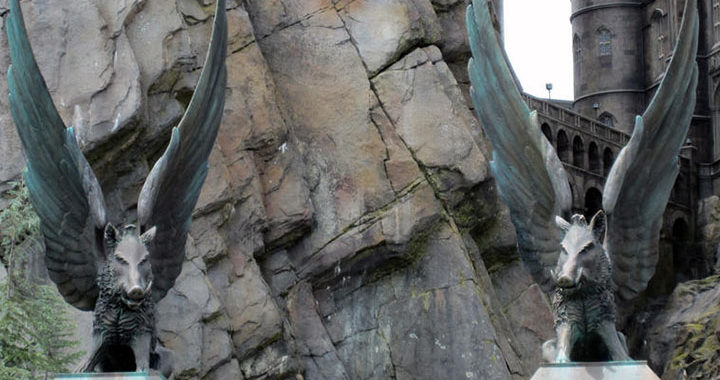Join hosts Ev, Sam, and Sophia and guest Nica as they discuss pigs in the Wizarding World as well as other J.K. Rowling books like The Running Grave and The Christmas Pig.
In this episode:
- Pigs!
- More Pigs
- Pigs at Hogwarts
- Is Harry a Pig?
- We be eating Pigs
- Christmas Pigs
- Pigs represent much
- Toy Story vs. Christmas Pig – the fight of our generation
- Dark Piggy Story
Resources:
- Why Pigs are the Secret Protectors of the wizarding world by Sophia
- Alivening HP through the Christmas Pig by Irvin
The Pub’s Jukebox:

I so enjoy this podcast, and especially the fact you are looking for insights into Potter by considering Rowling’s other works. I was skeptical about a deep dive on pigs, but now I am now a convert! Your exploration of pigs has deepened my appreciation for how Rowling understands magic and the wizarding world. I especially loved your reading of how the burrow is build in a pigpen – as though the foundations of the magical world are truly humble, hobbit-like people who were not overly intellectual or spiritual. That interpretation fits so nicely with everything else we know — their ignorance of math and science, the absence of strongly imposed formal religion are much evident passion for good works or self-improvement. I liked the contrast between pigs and peacocks.
To my mind, Irving, you are becoming the authority on connections between Potter and the Strike & Ellacott series. So, it should be no surprise that the pig authority and the Strike-Potter authority generated such wonderful insights. I absolutely agree that Rowling’s suggestion that pigs are difficult to enchant is tied in with the mind-control at Chapman farm. A fundamental belief of the UHC is the goal of becoming “pure spirit.” Along the way, believers repudiate their “flesh objects” and give up their right to refuse sex — they are renouncing their connection to their bodies, their “inner pigs,” if you will. The more “enchanted they become. In this context, pigs become perverted into child-destroyers. Rowling’s advice, , for this book at least, on how to avoid becoming slaves to the various “cults” that make up society, as well as the “cult” of an abusive relationship, is to stay “close to the ground,”
Throughout Rowling’s works I see indications that a critical part of being a good human is an acceptance of your inner-pig. In addition to all the wonderful pig connections you all found, I’d suggest the character of Ron typifies the “pig nature” or “appetite” that must be integrated into a healthy adult character. Without him, the intellect and the spirit don’t function as well.
And finally, I propose the Ink Black Heart is Rowling’s fullest exploration at what happens when we eschew our connection with our bodies. Gus wants to become god of the disembodied world, and he uses the lack of physicality to hide his sociopathic nature, leaving people like Morehouse, Zoe, Rachel, and Heartella, vulnerable to manipulation by Gus himself, and also right-wing terrorists. The agency’s attempt to join this world is a waste of time that continually prevents Robin from being fully present and connecting with those around her, especially Strike. Law enforcement, whose job it is to protect the vulnerable, are referred to exclusively as “pigs” by the Nazi terrorists. Might that be a Rowling-like suggestion that connecting with our pig nature can be a protection? I’d like to think so!
Hi Kathleen, thanks so much for both your kind words and your fascinating insights! Those are really good points, especially about the disembodied nature of Gus’s villainy.
And I’m reluctant to claim authority on Strike/HP connections because I don’t really have the breadth of knowledge about Strike required – that’s why we call in experts like Louise, Beatrice, and Nick for our Strike episodes! I do, however, read their essays diligently to stay on top of the discourse 😀
Ah go ahead and take the title until someone comes and slaps it out of your hand!
Kathleen! It was wonderful to hear from you. I hope you keep commenting, because I loved reading your comment. What a great insight into Ron – the most human of Harry (the gut) and Hermione (the head). I love this idea that we must hold on to our humanity, our inner pig, and that Rowling did a lot of research into the pigs.
I’m glad you have enjoyed our Pig Episode, Kathleen!
I love your characterisation of Ron’s “pig nature”, which makes the trio Mind (Hermione), Body (Ron), and Spirit (Harry). We need all three and that’s what makes them such a great team. I think it’ such a great reminder for us all that all 3 need nurturing in their own way.
Happy New Year!
~Ev
Whether or not a book/film/etc. is “age-appropriate” is a tricky question, which probably depends on both the topic and the child. And also whether the adult is ready to (potentially) discuss that topic with the child.
To paraphrase a comment I’ve seen going around recently: it’s perfectly reasonable to say a book is inappropriate for your child. It’s problematic to say it’s inappropriate for every child.
Plenty of childrens’ media have heavy/dark themes. How many people talk about still being traumatised by something like “The Neverending Story”? (Sure, the bog was depressing, but that wolf gave me nightmares…)
I suppose it is easier to thoroughly digest all the Strike commentary and understand the current Strike well. At this point, it feels impossible to wrap my head around the major themes if analysis regarding Harry. For example, Many people might be able to read everything that’s been written about the structure and meaning of the poisoned chocolates in Troubled Blood, but who else would be able to identify essays on Christmas hints in Potter?
And, thank you, Captain!